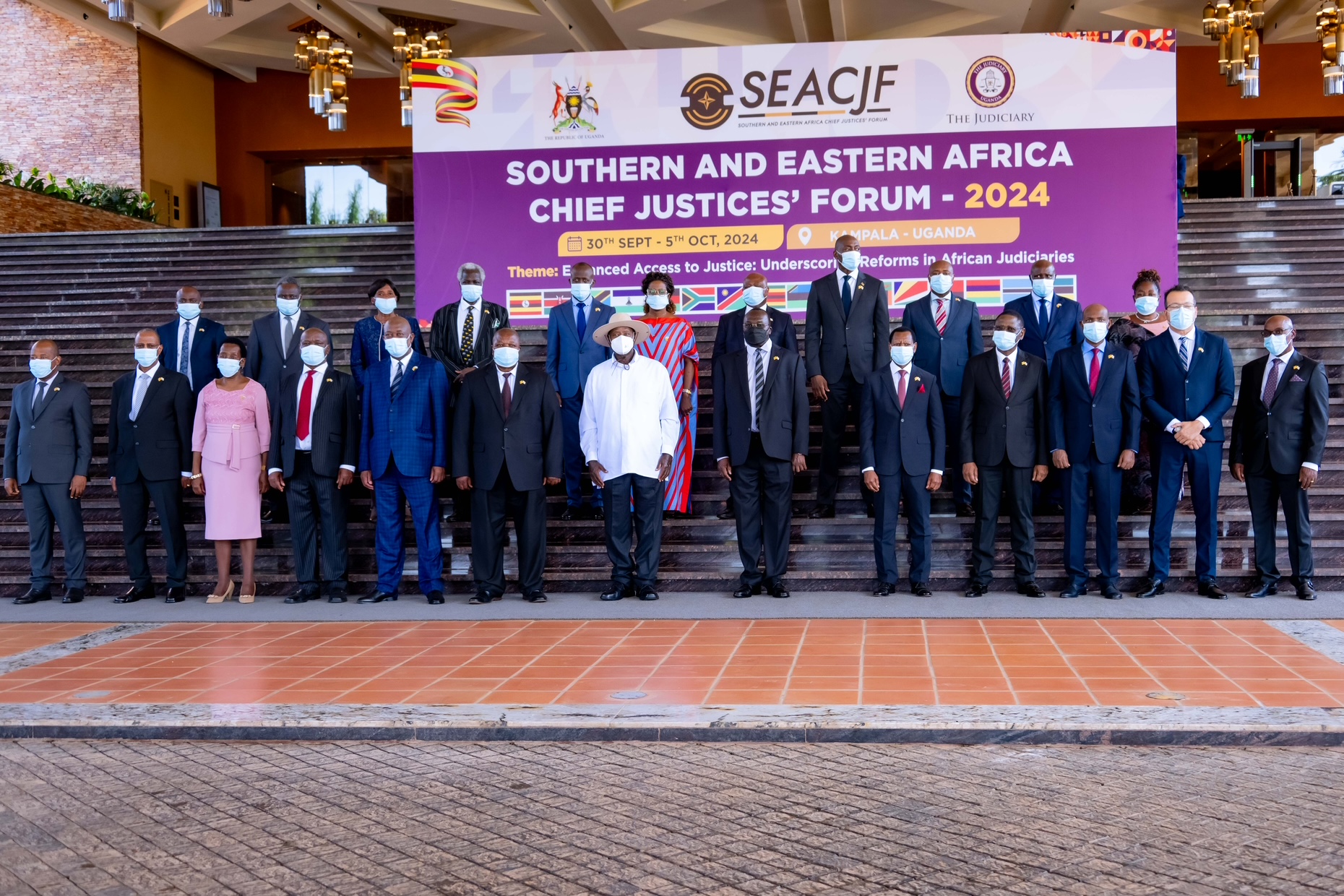News
Museveni Urges African Chief Justices to Prioritize Prosperity for Easier Justice Administration
President Yoweri Kaguta Museveni has informed African Chief Justices that it’s easier to administer justice when a country is prosperous.
“From our student days, in our movement, we always advised the African intelligentsia—the academicians, technocrats, the Judiciary, and lawyers—to have an organic way of looking at issues. If the economy of the country is growing and creating prosperity, it becomes easier to work on issues of justice,” he said.
President Museveni made the remarks on Tuesday while presiding over the Southern and Eastern Chief Justices’ Forum (SEACJF) Conference at Speke Resort Munyonyo, Kampala.
The conference ran under the theme: “Enhanced Access to Justice: Underscoring Reforms in African Judiciaries.”

President Museveni acknowledged that although justice issues can still be addressed in times of poverty, it is much easier when a country is economically stable.
“If there is growth in the prosperity of families and individuals, then the state has the financial resources to support the Judiciary,” he explained.
The President also highlighted the crucial role of education in the administration of justice.
“Education brings enlightenment, giving people more information. Some tensions in society are caused by a lack of knowledge, superstition, and belief in witchcraft because people don’t have enough knowledge about science,” he said.
“That’s why, in Uganda, we have pushed for universal education. Everyone must go to school and stay there for at least 14 years so they can learn about their bodies, their environment, and what’s happening in the world.”

President Museveni also cautioned the Chief Justices against the philosophical, ideological, and strategic mistakes of past African leaders, which have left the continent underdeveloped for centuries.
“I’ve been involved in these issues for more than 60 years, since the 1960s, as a young student, and I could see that part of the problem was having a clear understanding of philosophy, ideology, and strategy,” the President explained.
“Society is like medicine; a doctor must correctly diagnose your sickness. If the diagnosis is wrong, you will die, and this is the situation in some parts of Africa—the diagnosis was wrong.”
Citing Uganda as an example, President Museveni said the country’s past leaders focused on politics of identity based on religion and tribe instead of politics of interest, which left the country in disarray.
“When we came, we said no! What you are doing is pseudo medicine, your diagnosis is fake. What we need is prosperity for the individual, the family, the neighbor, and our country. And where does prosperity come from? It comes from producing a good or a service and selling it continuously to make profits,” he noted.

“Every adult must participate in the production of a good or service and sell it, but you must do it with what we call ‘ekibaro’ (economic analysis) to ensure you get out of poverty. We told our people that Uganda is more important than your tribe if you want prosperity. That is why we emphasize patriotism and Pan-Africanism, because they contribute to our prosperity.”
Additionally, President Museveni urged the Chief Justices to blend the positive aspects of European justice with African legal traditions to ensure full accountability.
The Chief Justice of Uganda, His Lordship Alfonse Owiny-Dollo, said the forum brought together Chief Justices and judges from over 16 countries to discuss contemporary issues affecting justice delivery in the region.
“This conference presents an opportunity to harness the collective wisdom and experience of our distinguished participants,” His Lordship Owiny-Dollo said.
“We are reminded of the willingness to learn from one another as we share common issues. During this conference, we will exchange best practices to enhance access to justice.”

He also commended the forum’s work and its achievements since its formation in 2003, noting that shared responsibilities and changing mindsets will ease judicial challenges.
The Chairperson of the Forum, Hon. Justice Bheki Maphalala, Chief Justice of the Kingdom of Eswatini, thanked President Museveni and his government for hosting the conference and annual general meeting in Kampala.
“We extend our sincere gratitude to the Judiciary of Uganda for the warm African hospitality extended to the forum since our arrival,” His Lordship Maphalala said.
He added that the forum, established in 2003, is a voluntary body of Chief Justices from Southern and Eastern African countries, recognizing the important role of Judiciaries in the administration of justice.
His Lordship Maphalala also praised President Museveni for improving the welfare of Ugandan judicial officers by increasing their salaries, improving Judiciary infrastructure, and raising the annual budget for the Judiciary.
Justice Mike Chibita, Chairperson of the SEACJF Organizing Committee, explained that the forum brings together justices and judges from 16 member states, with Uganda hosting this year’s event. The Annual General Meeting (AGM) serves as a platform for exchanging ideas on the latest legal developments, including environmental and cyber laws. It also provides an opportunity for members to discuss challenges like case backlogs and explore the use of technology to expedite judicial processes.

Justice Chibita also announced that Uganda’s Chief Justice, Alfonse Owiny-Dollo, extended invitations to Chief Justices from non-member states, including South Sudan, Burundi, and Somalia, as well as the President of the East African Court of Justice. These invitees will have the opportunity to observe the forum and potentially join as members.
Countries represented by Chief Justices at the SEACJF Conference include:
- Kingdom of Eswatini
- Botswana
- Burundi
- Lesotho
- Malawi
- Namibia
- Somalia
- South Sudan
- Tanzania
- Zanzibar
- Zimbabwe
- Kenya
- Uganda
Additionally, Mozambique, Zambia, and Angola had representatives at the conference.































